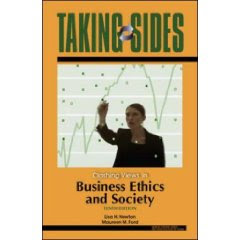Business EthicsRowan University, Fall 2008Philosophy 09322, Section 01Tuesdays and Thursdays, 4:45 p.m. – 6:00 p.m.Bunce Hall, Room 106 Instructor: Sean Landis
Email:
landis@rowan.eduPhone: 609-980-8367
Course Website:
http://rowanbizethics.blogspot.comRequired TextTaking Sides: Clashing Views in Business Ethics and Society, 10th Edition, Lisa H. Newton & Maureen M. Ford
About the CourseThis course is designed to introduce students to thinking critically about the ethics of economics and modern business practices. Throughout the semester, we are going to explore a handful of issues in business ethics, such as: Is capitalism an ethical economic system? Should corporations be socially responsible? Should governments regulate business practices?
In examining these topics, it is my hope that we can also develop the skills of doing philosophy—understanding and evaluating others’ attempts to answer puzzling moral questions. Ultimately, though, our main goal is to learn decision-making tools we can use to provide our own answers to these ethical dilemmas. Hopefully, this course will demonstrate that careful, systematic, and critical thought about moral quandaries can be fruitful.
Grades A = 934-1000 total points
A- = 900-933 total points
B+ = 867-899 total points
B = 834-866 total points
B- = 800-833 total points
C+ = 767-799 total points
C = 734-766 total points
C- = 700-733 total points
D+ = 667-699 total points
D = 634-666 total points
D- = 600-633 total points
F = below 600 total points
Midterm 20%
Final 35%
Quiz 10%
Consensus Leading 15%
Paper 15%
Attendance/Participation 5%
Exams: There will be a midterm and a final exam. The midterm tests everything covered during the first half of the course, and will last the full period (80 minutes) on the scheduled day. The final exam is cumulative—that is, it tests everything covered throughout the whole course. The final will also last 80 minutes, and will take place on the last day of class.
Quiz: There will be one quiz, taken during the 4th week of class. The quiz will last 20 to 25 minutes, and be held at the beginning of the period on the scheduled day.
Consensus Leading: For each issue we discuss, we will be holding a consensus session in an effort to determine whether we agree or disagree with the main points of the reading assignment for that issue. Groups of about 4 students will lead one consensus session by first giving a brief (5-10 minute) presentation and evaluation of the main arguments of the reading, and then running the consensus vote process itself.
Paper: There will be one paper (about 600-1000 words long) due toward the end of the semester. The assignment will be to explain and evaluate a pair of articles from our textbook that we do not go over in class.
Attendance/Participation: Most of this will be based on your attendance. If you’re there every class, you’ll get full credit for your attendance grade. Also, there will be a lot of informal group work throughout the semester. Group work can impact your attendance grade.
Extra Credit: There will be some optional extra credit assignments available throughout the semester.
Classroom PoliciesAcademic Integrity: Cheating and plagiarism (using someone else’s words or ideas without giving credit to the source) will not be tolerated in the class. Students found guilty of either will definitely fail the exam or assignment—and possibly the entire class. FYI: I’m pretty good at catching plagiarism. I recommend not trying it!
Excused Absenses: Make-up exams, quizzes, in-class projects, and oral reports will only be rescheduled for any excused absences (excused absences include religious observance, official college business, and illness or injury – with a doctor’s note). An unexcused absence on the day of any assignment or test will result in a zero on that assignment or test.














